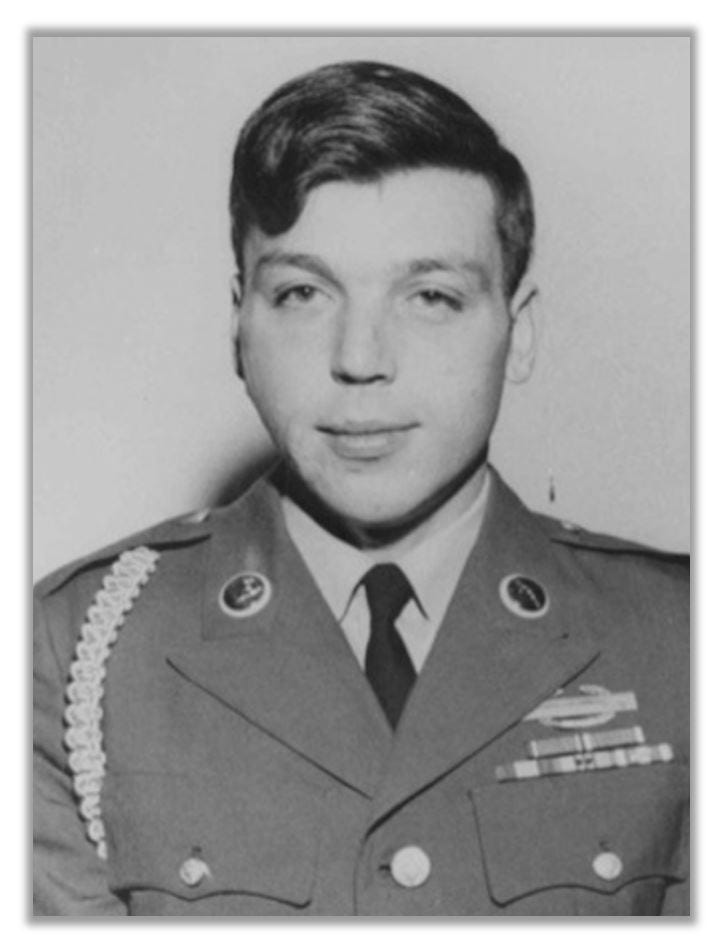Medal of Honor Monday: Jim Kinsman
“We are awfully proud of him,” his mother said. “but feel fortunate in having him back. You know, I think the prayers helped. He had a lot of prayers said for him while he was over there.”
During this week in 1969, a hero receives the Medal of Honor from President Richard Nixon. Thomas James “Jim” Kinsman was among the few to throw himself on a grenade—and to survive.
“We are awfully proud of him,” his mother told a reporter after the Medal ceremony. “but feel fortunate in having him back. You know, I think the prayers helped. He had a lot of prayers said for him while he was over there.”
Kinsman had been working in Washington’s timber industry when his draft notice arrived in 1967. Before he knew it, he was on his way to Vietnam where he would serve as an Army rifleman.
In many ways, Kinsman’s story is like so many: He worked with his fellow soldiers, traipsing through the jungles of Vietnam. Conflicts would arise suddenly and violently, from an enemy that kept itself well-hidden. Kinsman would later say that he was “jumpy” in this atmosphere, but he was determined to “pull his weight.”
He did even better than that on February 6, 1968. His company was making its way up a narrow canal in armored troop carriers when it came under attack. Our soldiers made their way towards shore, then launched their own assault on the hidden Vietcong.
Unfortunately, a small group, including then-Pfc. Kinsman, got cut off from the main force. They tried to find their way back, pushing their way through dense undergrowth, but that undergrowth, combined with smoke from explosions, made it difficult to see very well.
Suddenly, one of the enemy leapt out and threw a grenade. Kinsman yelled a warning, then unhesitatingly threw himself on it.
“He saw the grenade, he yelled ‘grenade,’ he realized the other guys were too close,” Chip Duncan, director of the Veterans Memorial Museum in Chehalis, Washington, said. “He took his helmet off and he put it on his chest and he jumped on the grenade and got the grenade underneath his helmet.”
Kinsman’s action is credited with saving the lives of seven other men.
Amazingly, Kinsman survived the ordeal, although he was in the hospital for months afterwards.
Kinsman was interviewed at home by a local journalist soon after his May 1969 Medal ceremony. The journalist wanted to know what had prompted Kinsman’s bold, heroic move. Was it training? Reflexes? Sense of duty? “[A] combination of all of them, I just don’t know,” Kinsman shrugged.
The journalist asked to see his Medal, but Kinsman had just gotten home from his logging job. He was in his work clothes and thought the Medal too special to touch until he got cleaned up. He later emerged with a “carefully ironed shirt and freshly pressed trousers,” holding the Medal for the journalist to see.
Kinsman got married and lived a simple farming life until his passing in 2017. He didn’t like talking about his experience, his son Reggie later said. “He just figured he did what he was supposed to do.”
Sources can always be found on my website, here.



Much like those of the Greatest Generation who did not like discussing what they did, those of the Vietnam era don't like discussing it either. I must say, in conversations with those in the Iraq War and Afghanistan don't like discussing it either. They saw really disturbing stuff that changed them.
Another great American Hero, just doing what he had to do to save others. Thank God for people like him in this world. RIP Jim! You’ve earned it.
❤️🇺🇸🇺🇸🇺🇸